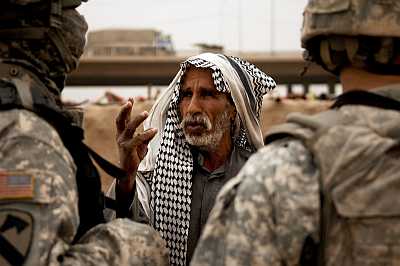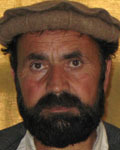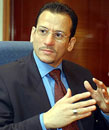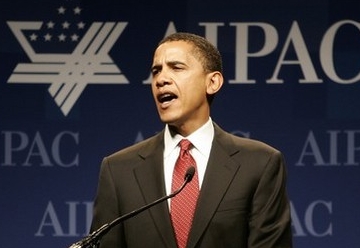Iraq ain’t no insurgency, say former Petraeus aides
I raq cooled from a raging boil to a slow simmer, thanks mostly to tactics taken from the military’s counterinsurgency manual. Or, at least, that’s the accepted wisdom. But a group of military thinkers and Iraq veterans says the established narrative is all wrong. According to them, Iraq may not even be an insurgency at all.
raq cooled from a raging boil to a slow simmer, thanks mostly to tactics taken from the military’s counterinsurgency manual. Or, at least, that’s the accepted wisdom. But a group of military thinkers and Iraq veterans says the established narrative is all wrong. According to them, Iraq may not even be an insurgency at all.
In the classic insurgency scenario, you’ve got a group of guerrillas on one side, and an otherwise-legitimate “host government” on the other. It’s the job of a military like America’s to tip the balance towards stability and order, by keeping the insurgents from overthrowing that government.
But in Iraq, “the bulk” of what used to be the insurgents have “now realign[ed] themselves with the American forces” against “the nihilistic-Islamist terrorist Al Qaeda in Iraq,” Lt. Col. Douglass Ollivant notes in the latest edition of Perspectives on Politics, which is devoted to a critique of the now-famous counterinsurgency manual. “With the Sunni nationalists at least temporarily allied and AQI deprived of its sanctuary among the Sunni population, just who are the insurgents in Iraq against whom a counterinsurgency might be conducted?”
Instead, what seems to be going on in Iraq is a “competition among ethnic and sectarian communities for power and resources,” as General David Petraeus put it. Shi’ites are fighting Shi’ites; Sunnis are battling Sunnis; splinter groups from both sects are waging a low-level religious war; AQI and other jihadists are stirring chaos; and criminal gangs trying to profit from the mayhem. It’s an “extremely difficult and lethal problem,” observes Lt. Col. Ollivant, who, until recently, was the chief of planning for U.S. military operations in Baghdad. “But it “is not exactly an insurgency.
Israeli ministers mull plans for military strike against Iran
Dani Yatom, a member of the Israeli parliament, the Knesset, was invited to attend a NATO conference in Brussels last year. While reviewing the agenda, Yatom, a retired major general, was surprised to see that the meeting was titled “The Iranian Challenge” and not “The Iranian Threat.”
When a speaker with a French accent mentioned that a US military strike against Iranian nuclear facilities would be the most dangerous scenario of all, Yatom said, politely but firmly: “Sir, you are wrong. The worst scenario would be if Iran acquired an atom bomb.”
Yatom, 63, has spent most of his life in the military. He was a military adviser to former Prime Minister Yitzhak Rabin and, in the mid-1990s, was named head of Israel’s Mossad intelligence agency. Nevertheless, Yatom, a member of the Labor Party, is not some reckless hawk. Unlike most Knesset members, he flatly rejects, for example, a major Israeli offensive against the Islamist Hamas in the Gaza Strip.
But Yatom’s willingness to strike a compromise ends when he is asked what he considers to be the best response to the Iranian nuclear program. “We no longer believe in the effectiveness of sanctions,” says Yatom. “A military operation is needed if the world wants to stop Iran.”
When Israeli Transportation Minister Shaul Mofaz, a former defense minister, expressed similar sentiments 10 days ago, they were viewed, especially in Europe, as the isolated opinions of a card-carrying hardliner seeking to score points with the electorate in a bid to succeed Prime Minister Ehud Olmert. In truth, however, there is now a consensus within the Israeli government that an air strike against the Iranian nuclear facilities has become unavoidable. “Most members of the Israeli cabinet no longer believe that sanctions will convince President Mahmoud Ahmadinejad to change course,” says Minister of Immigrant Absorption Yaakov Edri.
The assumption that the United States should exploit its military dominance to exert pressure on adversaries has long dominated the thinking of the US national security and political elite. But this central tenet of conventional security doctrine was sharply rejected last week by a senior practitioner of crisis diplomacy at the debut of a major new centrist foreign policy think-tank.
At the first conference of the Center for a New American Security (CNAS), ambassador James Dobbins, who was former president Bill Clinton special envoy for Somalia, Haiti, Bosnia and Kosovo and the George W Bush administration’s first special envoy to Afghanistan, sharply rejected the well-established concept of coercive diplomacy.
Dobbins declared in a panel on Iran policy, “I reject the theory that the implicit threat of force is a necessary prerequisite to successful diplomacy.”
Israel seems to make progress in talks
Israel appeared to be making diplomatic progress Monday on three fronts: a possible prisoner exchange with Hezbollah; a second round of indirect talks with Syrian representatives in Turkey; and a possible truce with Hamas in Gaza.
Israeli officials refused to comment about possible developments with the Lebanese militant group Hezbollah and said it would be premature to draw any conclusions about understandings with Syria or Hamas.
Some Israelis, meanwhile, have suggested that the current flurry of diplomatic activity is intended to distract attention from the political and legal troubles of Prime Minister Ehud Olmert, who the police say is suspected of receiving illicit funds.
Although the bells of peace between Israel and Syria have only just started ringing again, new peace plans are already springing up throughout the Middle East, and are just waiting for the negotiating team to pluck them and offer them as a gift to the other side. One of these, which can be described as no less than grandiose, has recently been set before the Knesset Foreign Affairs and Defence Committee. The plan proposes consolidating, institutionalizing, and strengthening the peace agreement being worked out between Israel and Syria by means of a “peace canal,” an international project for conveying water from Turkey via Syria and the Golan Heights, which could provide a solution for a many of the water problems affecting Syria, Israel, Jordan, and the PNA.
The plan, which is a kind of sister project to the “Red-Dead Canal” in the south, was dreamt up by Bo’az Wachtel, the former chairman of the Green Leaf party, in his role as a research associate at the US Freedom House Institute, which was founded by Eleanor Roosevelt, and which is involved in projects to advance peace and human rights in the world. And if you believe what Wachtel has to say, and the many elements who have heard about the plans and been impressed by them, water will soon be arriving at our taps direct from Turkey, perhaps after a stop in Damascus.
The plan is based on bringing 2-3 billion cubic meters of water per annum from two rivers in southern-central Turkey – the Seyhan and Ceyhan – in the area of the city of Adana. The rivers have a joint annual volume of some 14 billion cubic meters of water. Most of the water goes to waste and flows into the Mediterranean Sea uninterrupted. For comparison’s sake, the total joint water requirement of Israel and the Palestinians is “only” approximately 2 billion cubic meters annually.
Kandahar braces for Taliban battle
Afghan and Nato forces are redeploying troops around the southern city of Kandahar in preparation for a possible large-scale battle with the Taliban.
The soldiers have sealed off the Arghandab district just 30km north of Kandahar where the Taliban claims around 500 of its fighters are now in control of 10 villages.
Al Jazeera’s Hashem Ahelbarra, reporting from Kandahar, said the authorities had imposed a curfew and soldiers were building defensive lines, taking up positions on rooftops and patrolling just about everywhere as they await reinforcements for a counterattack on the areas taken by the Taliban.
Wrongly jailed detainees found militancy at Guantanamo
Mohammed Naim Farouq was a thug in the lawless Zormat district of eastern Afghanistan. He ran a kidnapping and extortion racket, and he controlled his turf with a band of gunmen who rode around in trucks with AK-47 rifles.
U.S. troops detained him in 2002, although he had no clear ties to the Taliban or al Qaida. By the time Farouq was released from Guantanamo the next year, however — after more than 12 months of what he described as abuse and humiliation at the hands of American soldiers — he’d made connections to high-level militants.
In fact, he’d become a Taliban leader. When the U.S. Defense Intelligence Agency released a stack of 20 “most wanted” playing cards in 2006 identifying militants in Afghanistan and Pakistan — with Osama bin Laden at the top — Farouq was 16 cards into the deck.
From California to Iraq, business has never been better for the controversial private security firm Blackwater Worldwide. Company President Gary Jackson recently boasted that Blackwater has “had two successive quarters of unprecedented growth.” Owner Erik Prince recently spun his company as the “FedEx” of the U.S. national security apparatus, describing Blackwater as a “robust temp agency.”
Such rhetoric may seem brazen, given Blackwater’s deadly record in Iraq and troubled reputation at home, but here is the cold, hard fact: Blackwater knows its future is bright no matter who next takes up residence at 1600 Pennsylvania Avenue.
The company’s most infamous moment came last September, when Blackwater operatives were alleged to have gunned down 17 Iraqi civilians in Baghdad’s Nisour Square. A U.S. military investigation labeled the shootings a “criminal event,” and a federal grand jury in Washington is hearing evidence in the case.
The day after the Supreme Court ruled that detainees imprisoned at Guantanamo are entitled to seek habeas corpus hearings, John McCain called it “one of the worst decisions in the history of this country.” Well.
Does it rank with Dred Scott v. Sanford (1857), which concocted a constitutional right, unmentioned in the document, to own slaves and held that black people have no rights that white people are bound to respect? With Plessy v. Ferguson (1896), which affirmed the constitutionality of legally enforced racial segregation? With Korematsu v. United States (1944), which affirmed the wartime right to sweep American citizens of Japanese ancestry into concentration camps?
Did McCain’s extravagant condemnation of the court’s habeas ruling result from his reading the 126 pages of opinions and dissents? More likely, some clever ignoramus convinced him that this decision could make the Supreme Court — meaning, which candidate would select the best judicial nominees — a campaign issue.
Can the US and France agree on a Post-Doha Lebanon Policy?
The US and France are struggling to find a common post-Doha policy on Hizbullah and Syria. France is exploiting the appointment of President Michel Suleiman to rehabilitate relations with Syria, which have been in the dumps since 2005. Washington is not happy with the Franco-Syrian honeymoon. This comes as little surprise, for it marks the failure of Washington’s Lebanon policy. President Bush wanted to wrest Lebanon from Syria’s sphere of influence as part of an over-arching effort to reform the Greater Middle East. It should be stated that Washington succeeded in driving Syria’s military out of Lebanon in 2005. But far from being able to accept this as a victory, President Bush stubbornly insisted on eradicating every expression of Syrian influence from its smaller and divided neighbor – a policy which seemed as unwise as it was unrealizable.
Differences between France and the US have came into sharp focus over the impending Bastille Day visit to Paris of President Bashar al-Assad. Although Syria’s diplomatic isolation has been crumbling over the last year, Assad’s trip to Paris will be a symbolic coming out party for the Syrian President. Washington has expressed dismay over France’s warming relations with Bashar. The foreign ministries of both countries have been working overtime to patch up their differences. Secretary of State Rice in a Saturday announcement says she is happy that France understands that Syria should not be completely rehabilitated. Kuchner responded to this with a soul searching announcement that he has misgivings about Assad’s visit to the epicenter of civilization, brotherhood, and liberty. All the same, he points out, Syria and France had a deal about the appointment of a Lebanese president. France is merely honoring this deal by inviting Assad to Paris. He assures America that Paris will not take undo pleasure in its renewed flirtation with Damascus.
Why is Bush helping Saudi Arabia build nukes?
Here’s a quick geopolitical quiz: What country is three times the size of Texas and has more than 300 days of blazing sun a year? What country has the world’s largest oil reserves resting below miles upon miles of sand? And what country is being given nuclear power, not solar, by President George W. Bush, even when the mere assumption of nuclear possession in its region has been known to provoke pre-emptive air strikes, even wars?
If you answered Saudi Arabia to all of these questions, you’re right.
Last month, while the American people were becoming the personal ATMs of the Organization of the Petroleum Exporting Countries, Secretary of State Condoleezza Rice was in Saudi Arabia signing away an even more valuable gift: nuclear technology. In a ceremony little-noticed in this country, Ms. Rice volunteered the U.S. to assist Saudi Arabia in developing nuclear reactors, training nuclear engineers, and constructing nuclear infrastructure. While oil breaks records at $130 per barrel or more, the American consumer is footing the bill for Saudi Arabia’s nuclear ambitions.

 he militants crept up behind Mohammed Akhtiar as he squatted at the spigot to wash his hands before evening prayers at the Guantanamo Bay detention camp.
he militants crept up behind Mohammed Akhtiar as he squatted at the spigot to wash his hands before evening prayers at the Guantanamo Bay detention camp.
 The Wikipedia entry for New York Times reporter,
The Wikipedia entry for New York Times reporter,  [The leader of the Libyan Islamic Fighting Group, Noman] Benotman surprised his hosts [in Kandahar in the summer of 2000 at a conference of jihadists from around the Arab world] with a bleak assessment of their prospects. “I told them that the jihadist movement had failed. That we had gone from one disaster to another, like in Algeria, because we had not mobilized the people,” recalls Benotman, referring to the Algerian civil war launched by jihadists in the ’90s that left more than 100,000 dead and destroyed whatever local support the militants had once enjoyed. Benotman also told bin Laden that the Al Qaeda leader’s decision to target the United States would only sabotage attempts by groups like Benotman’s to overthrow the secular dictatorships in the Arab world. “We made a clear-cut request for him to stop his campaign against the United States because it was going to lead to nowhere,” Benotman recalls, “but they laughed when I told them that America would attack the whole region if they launched another attack against it.”
[The leader of the Libyan Islamic Fighting Group, Noman] Benotman surprised his hosts [in Kandahar in the summer of 2000 at a conference of jihadists from around the Arab world] with a bleak assessment of their prospects. “I told them that the jihadist movement had failed. That we had gone from one disaster to another, like in Algeria, because we had not mobilized the people,” recalls Benotman, referring to the Algerian civil war launched by jihadists in the ’90s that left more than 100,000 dead and destroyed whatever local support the militants had once enjoyed. Benotman also told bin Laden that the Al Qaeda leader’s decision to target the United States would only sabotage attempts by groups like Benotman’s to overthrow the secular dictatorships in the Arab world. “We made a clear-cut request for him to stop his campaign against the United States because it was going to lead to nowhere,” Benotman recalls, “but they laughed when I told them that America would attack the whole region if they launched another attack against it.” rab leaders have reacted with anger and disbelief to an intensely pro-Israeli speech delivered by Barack Obama, the US Democratic presumptive presidential nominee.
rab leaders have reacted with anger and disbelief to an intensely pro-Israeli speech delivered by Barack Obama, the US Democratic presumptive presidential nominee.